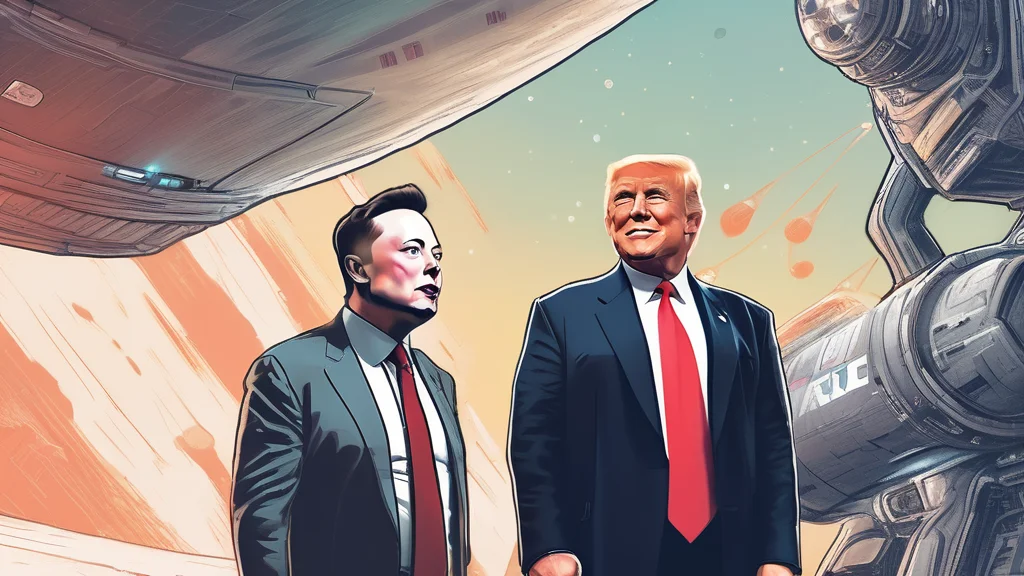The Collision Course of Elon Musk and Donald Trump: SpaceX's Government Contracts in Jeopardy
How the fallout between Elon Musk and Donald Trump could reshape government contracts and the aerospace industry.

- Explores the breakdown of the Musk-Trump relationship.
- Analyzes the $22 billion in SpaceX government contracts at risk.
- Discusses the broader implications for the tech industry.
- Presents multiple perspectives and potential outcomes.
In the ever-evolving landscape of American politics and business, few relationships have been as publicly scrutinized as that between Elon Musk and Donald Trump. While initially appearing as allies, their relationship has soured, with threats exchanged that could have profound implications for both parties, especially concerning SpaceX’s government contracts.
The Origins of a Fraught Relationship
Elon Musk, the visionary CEO of SpaceX and Tesla, initially served on two of President Trump’s advisory councils: the Economic Advisory Council and the Manufacturing Jobs Initiative. His involvement was seen as a bridge between the Trump administration and Silicon Valley, a region often at odds with Trump’s policies. Musk’s early collaboration with Trump was pragmatic, aimed at influencing policy decisions on climate change and innovation.
However, this alliance was not built to last. Musk resigned from both advisory roles in 2017, citing Trump’s withdrawal from the Paris Agreement as the primary reason. “Climate change is real,” Musk tweeted, underscoring his commitment to environmental issues over political alliances.
The $22 Billion Threat
The relationship took a turn for the worse when Musk criticized Trump’s tax and immigration bill. In response, Trump threatened to cancel federal contracts with SpaceX, which are valued at over $22 billion. These contracts include crucial missions to deliver supplies and astronauts to the International Space Station (ISS), a vital component of NASA’s operations.
SpaceX’s government contracts are not just a financial boon but also a testament to the company’s technological prowess and reliability. Losing these contracts could significantly impact SpaceX’s revenue and damage its reputation in the aerospace industry.
The Stakes for SpaceX
SpaceX has been a transformative force in the aerospace sector, dramatically reducing the cost of space travel through innovations like the reusable Falcon 9 rocket. The company’s collaboration with NASA has been a cornerstone of its success, with lucrative contracts that have supported its ambitious projects, including the development of the Starship spacecraft intended for Mars missions.
The potential cancellation of these contracts poses several risks:
- Financial Impact: SpaceX could lose billions of dollars in revenue, affecting its ability to fund future projects and innovations.
- Reputation and Trust: SpaceX has built a reputation for reliability and excellence. Losing government contracts could signal to other potential partners that the company is politically vulnerable.
- Operational Disruptions: The ISS relies on SpaceX for regular supply missions. Contract cancellations could disrupt these operations, affecting international collaborations in space.
A Broader Political Context
The clash between Musk and Trump is emblematic of a broader tension between the tech industry and political leadership. Silicon Valley has often been at odds with Trump’s policies on immigration, climate change, and trade, leading to a complex relationship between tech giants and the government.
The potential fallout from this specific altercation could set a precedent for how political disagreements might influence government contracts and corporate partnerships. As one expert noted, “This isn’t just about Musk and Trump. It’s about the intersection of politics and business in the 21st century.”
Counterarguments and Perspectives
While the risks are palpable, some argue that the threat to cancel contracts may be more bluster than reality. Government contracts are not easily revoked, particularly those involving national security and space exploration. Legal experts suggest that such cancellations would require substantial justification and could face significant legal challenges.
Additionally, Musk’s threat to decommission SpaceX’s spacecraft used for ISS missions highlights the interdependence between the company and NASA. Decommissioning these spacecraft would not only affect SpaceX but also jeopardize NASA’s ongoing space missions.
The Path Forward
If Musk and Trump cannot reconcile, it may force SpaceX to diversify its portfolio further, seeking more commercial clients and international partnerships. This could be an opportunity for SpaceX to reduce its dependency on government contracts and innovate independently.
Moreover, the situation serves as a cautionary tale for other tech companies navigating the political landscape. Building robust risk management strategies and fostering bipartisan relationships could be vital for sustaining operations amid political uncertainties.
Conclusion: Navigating the Intersection of Politics and Innovation
The spat between Elon Musk and Donald Trump is a stark reminder of the intricate dance between politics and business. As SpaceX stands at the crossroads, the outcome of this conflict could reshape the aerospace industry and redefine government-corporate relationships in America.
For Musk, the challenge lies in balancing his vision for the future with the realities of political engagement. For Trump, it is a test of his influence over American industry and the limits of political maneuvering.
As we watch these events unfold, one thing remains clear: the relationship between technology and politics is as volatile as it is vital. Stakeholders across all sectors must remain vigilant and adaptable, ready to navigate the complex interplay of innovation and governance.
In the end, this clash prompts us to ask: How can businesses and governments collaborate more effectively in the face of differing agendas and ideologies? And what role should public opinion play in shaping these high-stakes interactions?
References
- SpaceX and NASA Collaboration
- Musk’s Resignation from Advisory Councils
- Government Contracts and Legal Challenges
- The Paris Agreement and Climate Change
As we continue to explore these questions, the world watches, knowing that the outcome could set the tone for the future of innovation and governance.